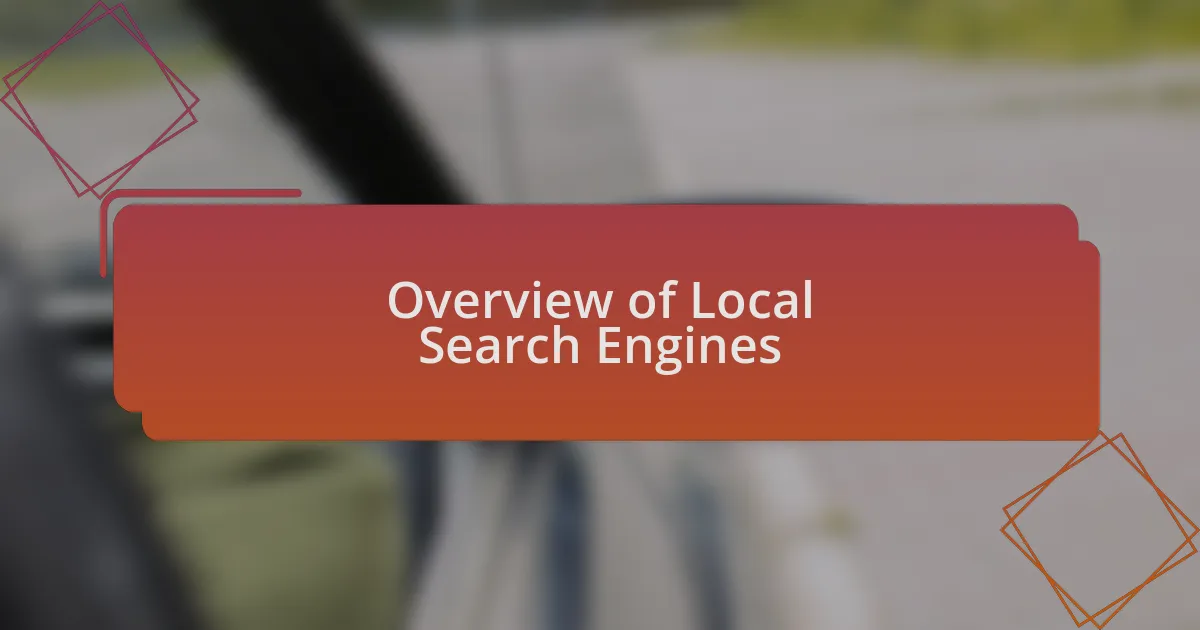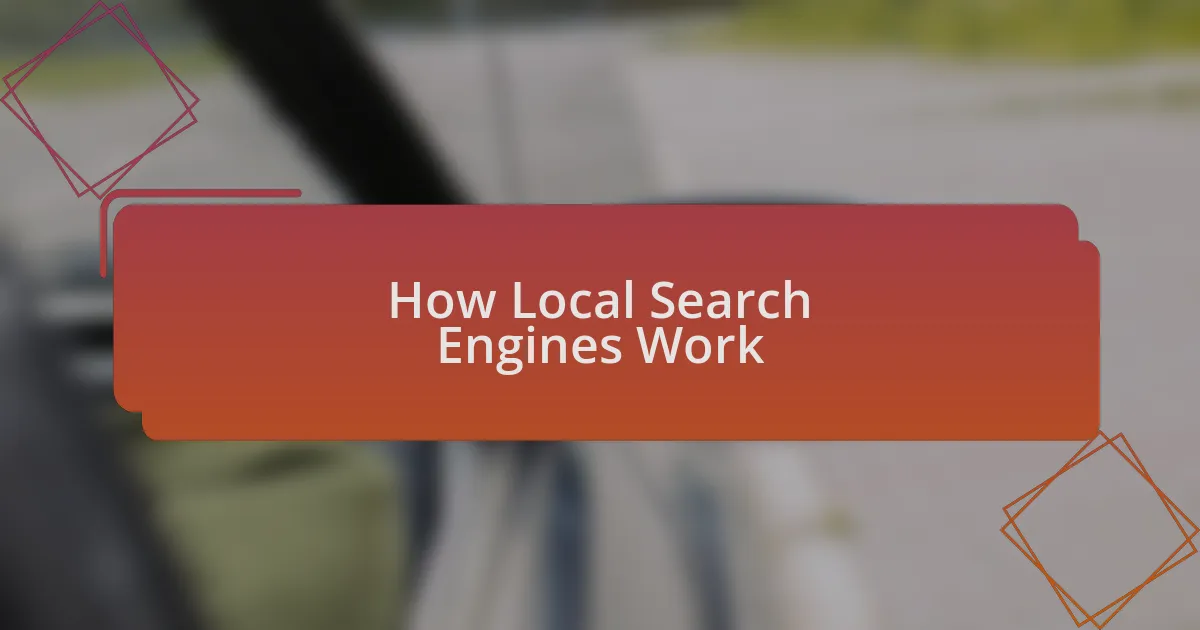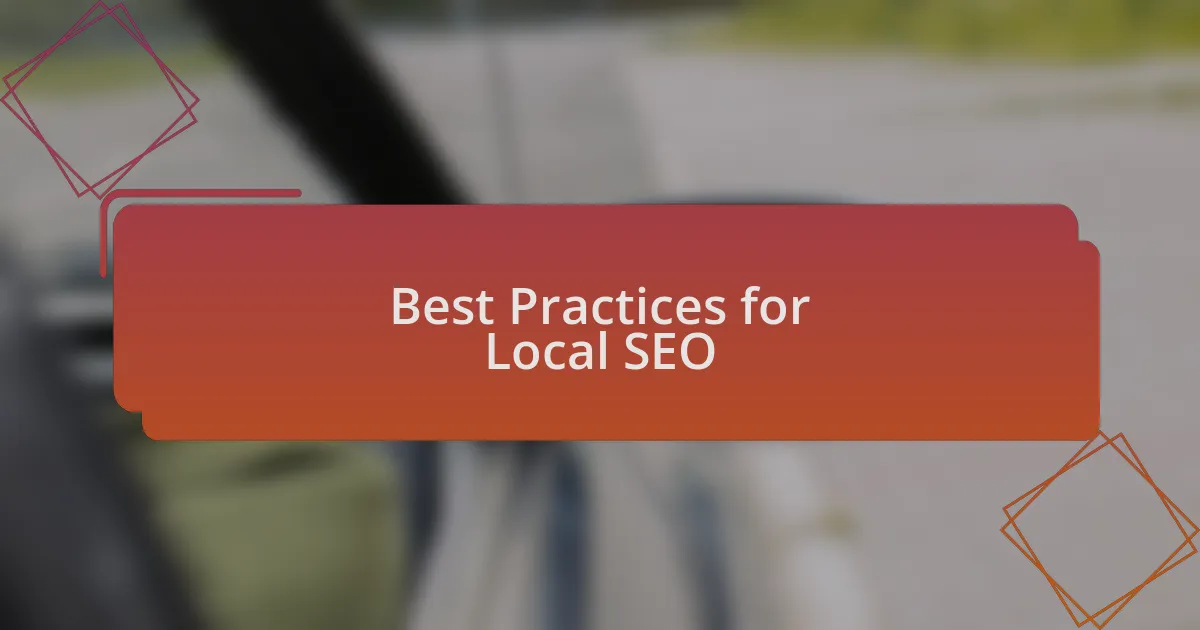Key takeaways:
- Local search engines connect users with nearby businesses, enhancing convenience and fostering community engagement.
- Optimizing local SEO, such as claiming Google My Business listings and encouraging customer reviews, significantly boosts business visibility and credibility.
- Participating in local events fosters genuine connections and loyalty that online platforms cannot replicate, emphasizing the importance of community support.

Overview of Local Search Engines
Local search engines play a pivotal role in connecting users with businesses in their vicinity. I remember the first time I used a local search engine to find a cozy café near my home; it felt like magic to find a hidden gem just around the corner. This ability to discover local spots makes them so invaluable in today’s fast-paced world.
When I think about local searches, I can’t help but wonder how they shape our daily experiences. Are we genuinely exploring our neighborhoods, or are we relying on algorithms to guide our adventures? I believe each search reveals not just a service but a story waiting to unfold in our own backyards.
Moreover, local search engines leverage unique algorithms to prioritize relevance based on geographical location, which I find fascinating. It’s like having a personal assistant who knows my preferences and nearby options at their fingertips. This technology not only enhances convenience but also fosters a sense of community, inviting us to engage more deeply with the local businesses that enrich our lives.

Importance of Local Search
Local search is crucial for anyone wanting to discover services and products tailored to their immediate surroundings. I recall a time when I was in need of a last-minute gift for a friend. Instead of wandering around aimlessly, I turned to a local search engine and found a delightful boutique that was just a few blocks away. It felt so rewarding to not only find what I needed quickly but also to support a local business in the process.
What really strikes me about local search is its ability to cater to individual needs. Have you ever found yourself impressed by tailored recommendations that seem almost uncanny? I often think of how local search engines draw from my previous preferences to suggest nearby restaurants and shops. This kind of personalization enhances my shopping experiences, making each interaction feel more relevant and rewarding.
Additionally, local search has a profound positive impact on small businesses. I remember chatting with a local bakery owner who expressed gratitude for how their visibility soared after optimizing for local search. There’s something special about knowing that technology can support local entrepreneurship, driving traffic to charming establishments that might otherwise get overlooked. It reminds me that behind every search, there’s a story of growth and community connection waiting to unfold.

How Local Search Engines Work
Local search engines operate by using algorithms designed to provide users with the most relevant results based on their geographical location. I remember the first time I typed in “coffee shop near me” and was delighted by the instant options that popped up on my screen. It’s intriguing how these engines analyze various signals, like my location and search history, to present the best matches.
The process behind local searches involves indexing businesses and gathering data from a variety of sources, including user reviews and business listings. Just the other day, I was looking for a new hair salon, and the engine showed me options complete with ratings and customer feedback. That transparency felt reassuring, as I could make an informed decision, which ultimately made me feel confident enough to try a new place.
Moreover, local search engines continually refine their methods to enhance user experience. Have you noticed how some searches return not only a list of businesses but also maps and directions? When planning a trip to another neighborhood, that added layer of convenience helped me navigate to the nearest grocery store seamlessly. It’s a reminder of how technology makes our lives easier, transforming local search into an indispensable tool for everyday tasks.

Best Practices for Local SEO
When it comes to optimizing local SEO, claiming and verifying your Google My Business listing is essential. I recall the moment I completed this step for my small bakery; within days, I noticed a spike in foot traffic. Isn’t it incredible how a simple verification can enhance credibility and visibility, making it easier for locals to find their way to your door?
Another fantastic strategy is to encourage satisfied customers to leave reviews. I’ve seen firsthand how positive feedback can transform a business’s online presence. I remember a colleague who relied on glowing reviews to attract new clients; each new review not only bolstered their reputation but also gave potential customers a clearer picture of what to expect. It makes you wonder, how much influence do those small, written words have in building trust?
Finally, integrating local keywords throughout your website is crucial. When I revamped my shop’s online content with phrases relevant to my community, the change was striking. I could feel the connection grow deeper with my audience, as if I were speaking directly to them. Have you tried using neighborhood names or local landmarks in your content? It’s a subtle yet powerful way to engage your audience while boosting your search rankings.

Key Takeaways from the Fairs
Attending the annual fairs in Essex has been a treasure trove of insights for me. I noticed that local businesses who actively participated had a unique edge; they were not just showcasing their products but creating genuine connections with attendees. It made me think: how valuable is it to engage face-to-face with your community? Those interactions created loyalty that no online presence could replicate.
Another standout takeaway was the power of community support at these events. I remember chatting with a local artist who shared how the fair helped him establish a loyal customer base within just a weekend. This experience highlighted for me the importance of fostering relationships with local patrons. Isn’t it inspiring how shared experiences can turn first-time visitors into lifelong customers?
Lastly, the fairs showcased the significance of storytelling in marketing. During a talk, a local farmer described his journey from field to table, and I could see the attendees light up with interest. It struck me that compelling narratives resonate more than mere sales pitches. Have you ever considered how your own story can captivate your audience? I believe that integrating personal narratives into your marketing can deepen those local connections.